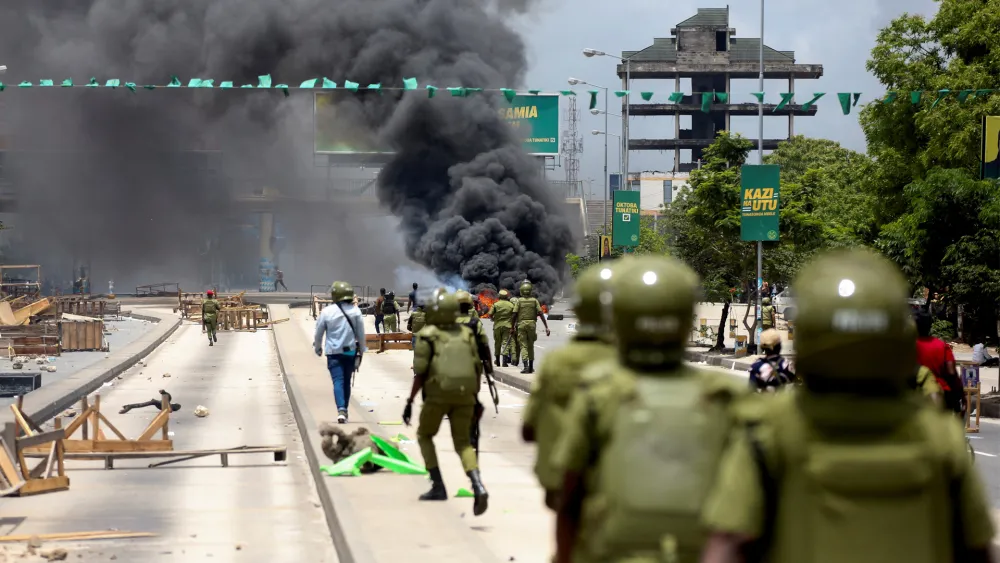
There’s a corner of Kakuma refugee camp known as the Burundian market where Esperance Mapendo, a former nurse from the Democratic Republic of the Congo, runs a small general store.
Her shop is stacked with cooking oil, matchboxes, salt, packets of flour and charcoal in nylon sacks. On a slow day, she reorganises the display. On a bad day – and they are becoming more frequent – she sits and waits for customers who do not come.
Mapendo started her business with the little money she had managed to save. “Capital is something you must raise on your own,” she explained. “You begin with what you can manage, as no one provides the boost to start a business.”
Even if it’s only 1,000 Kenyan shillings (roughly $8), “you start with that,” she said. “Only later can you go to Inkomoko (an NGO that provides credit to micro-entrepreneur)] or the bank.”
Kakuma is semi-desert – harsh, blinding, unforgiving. Life for a refugee business person here is stitched together from fragments: a little aid relief, a modest turnover and, if you’re lucky, an occasional offer of credit from an NGO lending service.
“You cannot rely entirely on your business,” said Mapendo. “I survive because of the WFP (World Food Programme) rations – rice, beans, cooking oil. The business money is for extras. Charcoal. Soap. Vegetables. When the Bamba Chakula [e-voucher] support came, that is when I could buy school uniforms, take my children to the salon.”
The Bamba Chakula (“get your food” in Kiswahili) programme allowed refugees to buy more nutritious items to supplement the basic dry rations using mobile money. But a cash-strapped WFP halted the scheme earlier this year, drastically reducing purchasing power across the camp, and sending shockwaves through refugee-run businesses.
“Bamba is gone, and business is no longer business,” Mapendo says.
And it’s about to get worse. Starting this month, WFP and the UN’s refugee agency (UNHCR) are moving to a “differentiated assistance” framework that will prioritise the most in need – although after several years of cuts and delays to rations, that would almost by definition be nearly everyone here.
Faced with huge budget shortfalls, WFP and UNHCR are trying to rationalise what dwindling aid they can provide. Refugees in Category 1 (classed as highly vulnerable) and Category 2 (households with limited ability to meet their basic needs) will receive food rations at 40 per cent and 20 per cent of the recommended minimum food basket respectively.
Categories 3 (partially self-reliant) and 4 (self-reliant) will not receive any rations, but “may benefit from livelihood interventions, subject to eligibility and availability of resources”, WFP said in a statement.
Last month, violent protests broke out in Kakuma – for the second time in a year – over ration cuts and the hardships they are bound to cause.
People in Kakuma are highly vulnerable to the economic hit of late or reduced rations. They try to find ways to make money and be less dependent, but even those that work for NGOs and UN agencies in the camp earn little and struggle to save, studies show.
To get by month to month, refugees typically rely on credit. Shopowners are the usual lenders – with Bamba Chakula vouchers used as collateral. But over the years, levels of indebtedness have soared. In 2023, almost 90 per cent of refugees in Kakuma were in debt – an unsustainably high rate.
“As soon as Trump made the announcement, we saw changes immediately”
When we visited Kakuma in June, the impact of earlier ration cuts was already evident. Customers had tightened their belts and store-owners were sitting behind their counters for longer without doing any business. Talk of robberies and break-ins were commonplace.
Julius, who only wanted to give his first name, started his shop in 2018 with the equivalent of $40 he had saved from 18 months of odd jobs. Now he feels his business is in danger of folding.
“Last week, thieves tried to get in through the roof,” he said, standing next to the shop’s metal door. “I haven’t slept. Things have become tough. With Bamba gone, I fear people might start turning on each other.”
Kakuma camp was established in 1992 in Kenya’s remote north-western region. It hosts over 270,000 refugees and asylum seekers from mainly South Sudan, Somalia, and the DRC, developing over the years into a self-contained economy.
“We’re trying really hard to survive, but these efforts are not always paying off.”
Around 2,500 mini-businesses operate in Kakuma and the neighbouring Kalobeyei settlement, with cafés, tailors, salons and electronic shops jostling for customers. Kenya’s Equity Bank recognised the potential for refugee wealth creation and opened a branch – a landmark in financial inclusion.
Nshimirimana Claude, the chair of Burundi market, said the easy part was opening a business: There are few regulatory hurdles, permits are not hard to obtain, and the county government is supportive.
Yet the low spending power of refugees means it’s a struggle for even the most resilient of entrepreneurs. And, beginning with the cancelling of US aid funding globally in January, it has been an especially hard year.
“As soon as [US President Donald] Trump made the announcement, we saw changes immediately. People stopped ordering stock. Households cut their spending,” Claude said, adding that his daily sales plummeted from around $150 to just $30.
“We’re trying really hard to survive but these efforts are not always paying off,” he said. “You can see this environment: It’s dry, it’s hot. You can’t grow your own food. Without food aid, life here is really miserable.”
In March, the government launched the Shirika Plan, an initiative to promote refugee self-reliance – made all the more urgent in the wake of the aid cuts. The idea is for the country’s refugee camps to become integrated settlements, allowing refugees and host communities to live and work side-by-side.
It builds on Kenya’s Refugees Act 2021, which grants refugees the right to work, freedom of movement in designated areas and the right to own property.
In a significant shift from the aid-dependent encampment policies of the past, Kakuma will become a municipality administered by the Turkana county government, which will eventually take over service delivery from UN agencies and NGOs.
But it’s a policy change that many in Kakuma seem unsure of.
“I’ve heard it mentioned,” said Ahmed Abdirahim, a Somali refugee. “But I haven’t figured out exactly how I can get this assistance.”
Another refugee, Grace Amani, echoed the sentiment: “I’ve heard about this Shirika Plan in local conversations but so far I don’t know of anyone in my circles who has benefited.”
For people in Kakuma – the business owners included – the priority right now is survival before anyone can contemplate planning for the future.
- A Tell Media report / By Joseph Maina / Republished with the permission of The New Humanitarian







